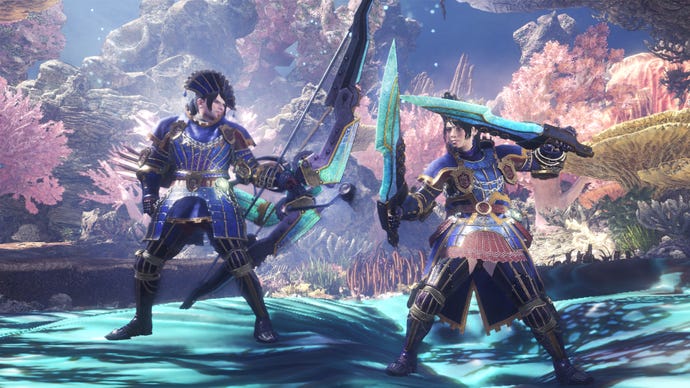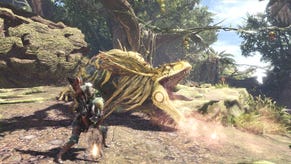Meet the YouTubers Using Math to Unlock the Depths of Monster Hunter: World
An inside look at Monster Hunter Math, a mathematical video series from masterminds JinJinx and Tuna.
This article first appeared on USgamer, a partner publication of VG247. Some content, such as this article, has been migrated to VG247 for posterity after USgamer's closure - but it has not been edited or further vetted by the VG247 team.
Correction, 09/05/2019: In the original article, we incorrectly said JinJinx was using an online module tool called Honey Hunters Club, when that is the name of the creator's website. We have amended the article to reflect the tool's name, MHW Builder, and added a link to the creator. We regret the error.
There was a time, not too long ago, where JinJinx was forced to calculate all of his data manually. Monster Hunter: World is not known for playing its cards face up. There are so many variables: elemental damage, sharpness modifiers, ammo type, food buffs—the statistical dark matter that gives the game its life. Imagine consolidating all of that data into zillions of Excel cells. It's difficult to conceptualize, one of the true Sissyphean stunts in YouTube history. But JinJinx did it, because somebody had to.
"I spent all my time in spreadsheets, I took all the numbers, I crunched out new sets for everything. You had to take screenshots of all the builds," he says. "I made giant spreadsheets comparing the different combinations to what had the highest stats. That's what we had to do in the past. We don't have the tools that we have now."
JinJinx, who is 26 and lives in Atlanta, has better tools now. He uses an online module called MHW Builder (developed by creator Honey and hosted on their site Honey Hunter's Gathering Hub), which atomizes all the disparate tendrils of a Monster Hunter avatar into an automated template, letting you drag-and-drop different itemsets directly into a simulated character sheet. It removed the incredible density of his craft—he no longer had to live amongst a forest of Google Docs—but the end goal remains the same.
Tune into his YouTube channel, and you'll witness JinJinx and his partner Tuna annotate the objective, scientifically-sound optimal builds for each weapon and strategy in Monster Hunter: World. Their fans know them collectively as the Monster Hunter Math Guys. In a typical video, the pair will broadcast the esoteric calculations they use to calculate the effective DPS of a particular in-game ensemble, in the same way theoretical physicists talk about tracking the God Particle. When JinJinx gets rolling, he sounds downright Einstenian.
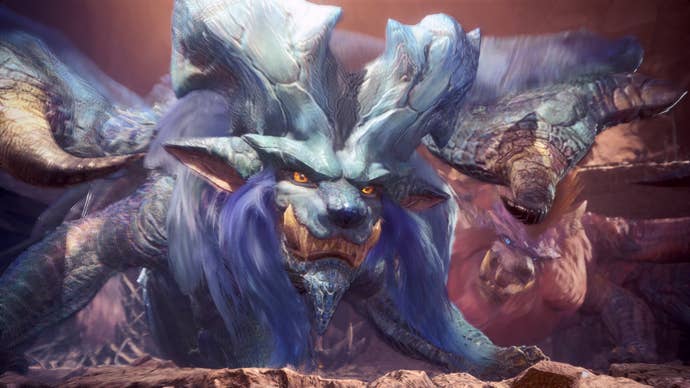
"The crit modifier for the bow is 1.35-times, so if we assume that we have 100 percent affinity, we multiply that one to 1.35 to get 1.35," he says, in a recent video, describing how exactly bow damage works in Monster Hunter. "Now the elemental modifier for bow-shots is anywhere from 0.5 to 1.1, so we'll use 1.1 for the best-case scenario. The average weak point for element is 25 to 30 hit-zone value. So now we have 1.35 times 1.1 times 0.3. This equals 0.4455, which means the majority of the time this will round down to zero damage gained."
Before his YouTube career JinJinx poured several hundred hours into the Souls franchise. He spent endless evenings min-maxing his characters in Oblivion. So it was kismet when he first picked up Monster Hunter: World after a brief dalliance with Monster Hunter Tri. The series is famous for its arcane statistical potential—it happily allows anyone to get lost in its systems—and that made perfect sense for a career grognard. JinJinx first fell in love with math as a grade-schooler in his native England, and says he was "always drawn to problem solving and analysis." So, when he first submerged himself in World, he discovered that the community's bread-and-butter understanding of the game's calculations were limited. This motivated him to hit the books. One of the first offerings he made to the community was an evaluation of optimal Bowgun damage, calculated in a way that only JinJinx could.
"There was a lack of information on the numbers. I went out of my way to learn how the formulas work," he explains. "I recorded all the different recoils of all the different bowgun animation times. I [deduced] the optimal DPS on animation time rather than flat numbers. I still have that spreadsheet, and it is hefty."
In many ways, Tuna, who is 27 and lives in Illinois, is the opposite of JinJinx. He was introduced to Monster Hunter by a former co-worker, who wanted him to join in on the 3DS-only Monster Hunter 4 Ultimate, and was struck with a very familiar fear when he heard what this franchise entailed. "My co-worker described it as this really difficult game, with no internal explanation for anything. I was like, 'Huh, that doesn't really sound fun,'" he laughs. Eventually, though, Tuna was seduced by Monster Hunter: World, when he heard that it was specifically designed to be the most approachable entry in the series. Six months into that game's lifespan, Tuna tumbled into the community, and stumbled upon the Discord channel of fellow Monster Hunter content creator Arrekz. It was there that he found JinJinx uploading savant-level runs through some of the New World's most treacherous hunts. JinJinx wanted feedback on the tone and tenor of his early, prototypical videos, and Tuna did not hold back.
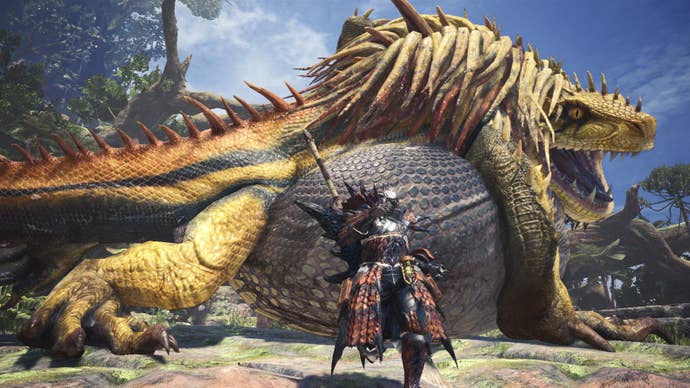
"Hand of God, this is what happened: I told Jinx his videos sucked and that I could do it better," remembers Tuna. "I was like, 'I'll record some lines for you, and we'll go from there.'"
This was the impetus of their partnership. JinJinx focuses on all the numbers-crunching and min-maxing, while Tuna handles the managerial duties, like YouTube algorithm juicing, community management, and Patreon promotion. It is like Elton John and Bernie Taupin, if those two toppled Ajanaths instead of writing love songs.
Today, Tuna and JinJinx share equal speaking time in their videos, and they refer to their business model as a pure, 50/50 split in revenue. Between YouTube ad money, Twitch partnerships, and Patreon support, they've turned enough money to leave their day jobs behind in order to make a living off of Monster Hunter math. JinJinx, obviously, is where the bulk of the algebra comes from. He has a rare, fluid understanding of the game's intentionally delphic mechanics, but he reiterates over and over again how Tuna is responsible for getting their YouTube careers off the ground: "Our community literally would not exist if not for him."
Tuna fell in love with Monster Hunter the way everyone does: slowly but surely untangling the abstruseness, decrypting the game underneath. World has shipped over 12 million copies; clearly he isn't the only one who's learned to deal with the constant death. Still, I was curious to know how possible it is to mathematically solve a game like Monster Hunter: World. Can there really be an optimal build? Or are there some parts of this game that remain ambiguous and uncrackable, no matter how much arithmetic we computate? Is there any art to the science?
"Yes and no. There is some perspective involved. Our sets are saying, in a vacuum, if you hit this thing, you'll be doing 'this' amount of damage," says Tuna. "But there's a skill called Peak Performance which gives you an attack boost if your health is full. We recommend that everyone takes Health Augment if you're taking Peak Performance, because you gain health back if you deal damage. But if you never get hit, you never have to heal. So, [in that case] taking Health Augment is actually less damage than more damage boosts."
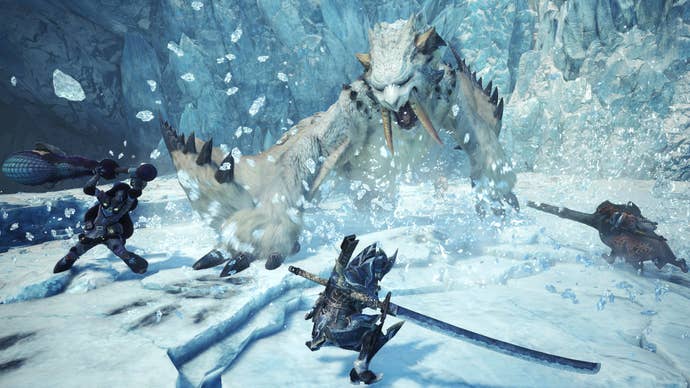
"So if you change the healing augment to a damage-focused one, you'll be doing more damage, but you also have to reset the Hunt as soon as you get hurt," adds JinJinx. "There is a level of adapting our builds to the best reasonable scenario. The idea is that we're giving you builds that have the highest damage numbers, given that you can use your normal mechanics to avoid things you'd otherwise have to compensate for."
These sort of messy fringe cases have changed Tuna's perspective on how video games are supposed to introduce new players. Now, he believes that there can be something powerful about only getting a sliver of the information, and turning to the friendly guidance of a global community for help when the chaos leads you astray.
"I started to understand this cathartic pleasure in getting your ass kicked for hours, learning the fight, and coming back to beat [a monster's] pants off," he says. In their professional lives, both JinJinx and Tuna have been in positions where they've been asked to train amateurs. Tuna, in particular, held down a career in logistics, and remembers what it was like to be thrown into an office where he was expected to figure things out on the fly. He says that showing people the ropes was always his favorite part of the job. It feels like paying it forward; representing a firm bit of ground—a true north amid all of Monster Hunter's integers and confusion.
But still, the Monster Hunter Math Guys wouldn't mind if someday Capcom would make the work they put on YouTube and in Excel a little less necessary. JinJinx understands that, at the end of the day, people look to his guidance because Monster Hunter categorically refuses to offer any of the answers itself. While he certainly enjoys his oracle reputation, he isn't fond of how the game's monolithic barrier of entry enforces a hard cap on the average Monster Hunter fan. It's a surprisingly progressive position, for someone so invested in the game's tricky math problems.
"I really enjoy teaching this stuff. It's why I've been involved in this game for so long, it's why we make videos. It's a passion of mine. I like how I can teach mechanics about weapons people don't know, but it makes the game less approachable," he says. "I'm not saying that it needs to be like other triple-A games where they handhold you the whole way. But just teaching the basics, where you can play the game, is still lacking in Monster Hunter. World is a step in the right direction, but it's not all the way there."
Would a more coherent Capcom dampen some of the wonder a game like Monster Hunter can summon? Doesn't the real magic of this franchise surface in Discord channels? Is it more fun to figure out the answers on your own? That's a debate for another day. What we know for sure is that Iceborne is right around the corner, and the duo is already testing the Switch Axe numbers in the training yard.
